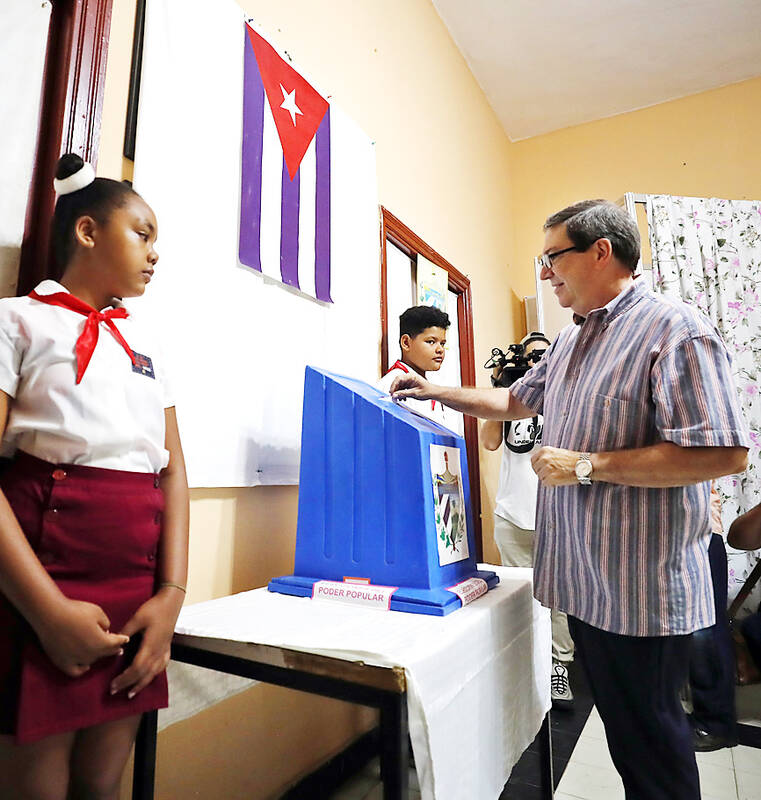Cuba’s government on Sunday said it managed to mobilize voters for the National Assembly elections, the results of which were a foregone conclusion, as it pushed back against a recent abstentionist trend in the communist-ruled nation.
As many as 8 million eligible voters selected from the 470 candidates on the ballot — 263 women and 207 men — vying for the 470 seats in the congress.
However, what was really in play was the number of Cubans refusing to vote.

Photo: EPA-EFE
The opposition had called on citizens to abstain, with one opposition Twitter account branding the vote a farce.
Voting is not obligatory and abstention has risen steadily in the past few years.
On Sunday, the nation’s 23,648 polling stations closed at 7pm, an hour later than initially announced by authorities.
According to the latest provisional figures released by the National Election Council, as of 5pm, turnout stood at 70.33 percent.
That marked a modest increase from the 68.5 percent who voted in last November’s municipal elections, the lowest turnout since the island’s current electoral system was set up in 1976.
In September last year, about 74 percent of eligible Cubans voted in a referendum on a new family code, down from the 90 percent turnout in the 2019 referendum on a new constitution.
The communist government does not allow opposition, so most parliamentary candidates are members of the Communist Party of Cuba.
Still, candidates must receive 50 percent of votes to be elected.
Voters had two choices: They could tick the names of any number of individual candidates, or they could select the “vote for all” option.
“I voted for the unified vote because, despite the needs, the difficulties that this country can have, I could not imagine” abstaining, said Carlos Diego Herrera, a 54-year-old blacksmith in Havana.
He said abstaining would be like voting “for those that want to crush us, the Yankees.”
Washington has imposed sanctions on the island nation since 1962, three years after the communist revolution that saw Fidel Castro take power after overthrowing US-backed dictator Fulgencio Batista.
Student Rachel Vega, 19, also said she voted for all candidates, considering it “a step forward right now” that would “improve the situation in the country.”
Cuban President Miguel Diaz-Canel is among the candidates, as is his predecessor, 91-year-old Raul Castro.
“With the united vote we defend the unity of the country, the unity of the revolution, our future, our socialist constitution,” said Diaz-Canel, 62, after voting in Santa Clara, 280km southeast of Havana.
The opposition scoffed at the turnout figures, with dissident Manuel Cuesta Morua of the Council for the Democratic Transition in Cuba warning about “the government’s electoral mathematics.”
“At 9am it reports that 18.2 percent of the electorate has voted. At 11am it says 41.66 percent -- that is, in less than two hours the turnout increased by 23.46” points, he said on Twitter.
“Impossible!!! The polling stations are empty,” he added.
Final figures were to be released yesterday.

A new online voting system aimed at boosting turnout among the Philippines’ millions of overseas workers ahead of Monday’s mid-term elections has been marked by confusion and fears of disenfranchisement. Thousands of overseas Filipino workers have already cast their ballots in the race dominated by a bitter feud between President Ferdinand Marcos Jr and his impeached vice president, Sara Duterte. While official turnout figures are not yet publicly available, data from the Philippine Commission on Elections (COMELEC) showed that at least 134,000 of the 1.22 million registered overseas voters have signed up for the new online system, which opened on April 13. However,

EUROPEAN FUTURE? Albanian Prime Minister Edi Rama says only he could secure EU membership, but challenges remain in dealing with corruption and a brain drain Albanian Prime Minister Edi Rama seeks to win an unprecedented fourth term, pledging to finally take the country into the EU and turn it into a hot tourist destination with some help from the Trump family. The artist-turned-politician has been pitching Albania as a trendy coastal destination, which has helped to drive up tourism arrivals to a record 11 million last year. US President Donald Trump’s son-in-law, Jared Kushner, also joined in the rush, pledging to invest US$1.4 billion to turn a largely deserted island into a luxurious getaway. Rama is expected to win another term after yesterday’s vote. The vote would

ALLIES: Calling Putin his ‘old friend,’ Xi said Beijing stood alongside Russia ‘in the face of the international counter-current of unilateralism and hegemonic bullying’ Chinese President Xi Jinping (習近平) yesterday was in Moscow for a state visit ahead of the Kremlin’s grand Victory Day celebrations, as Ukraine accused Russia’s army of launching air strikes just hours into a supposed truce. More than 20 foreign leaders were in Russia to attend a vast military parade today marking 80 years since the defeat of Nazi Germany in World War II, taking place three years into Russia’s offensive in Ukraine. Putin ordered troops into Ukraine in February 2022 and has marshaled the memory of Soviet victory against Nazi Germany to justify his campaign and rally society behind the offensive,

CONFLICTING REPORTS: Beijing said it was ‘not familiar with the matter’ when asked if Chinese jets were used in the conflict, after Pakistan’s foreign minister said they were The Pakistan Army yesterday said it shot down 25 Indian drones, a day after the worst violence between the nuclear-armed rivals in two decades. Pakistani Prime Minister Shehbaz Sharif vowed to retaliate after India launched deadly missile strikes on Wednesday morning, escalating days of gunfire along their border. At least 45 deaths were reported from both sides following Wednesday’s violence, including children. Pakistan’s military said in a statement yesterday that it had “so far shot down 25 Israeli-made Harop drones” at multiple location across the country. “Last night, India showed another act of aggression by sending drones to multiple locations,” Pakistan military spokesman Ahmed